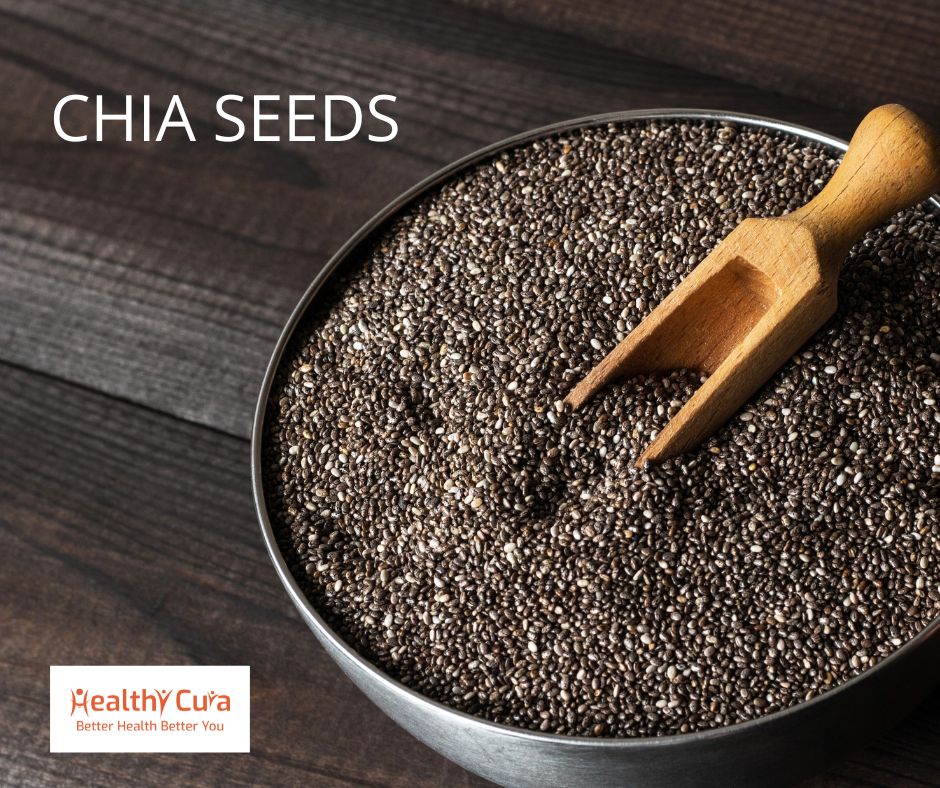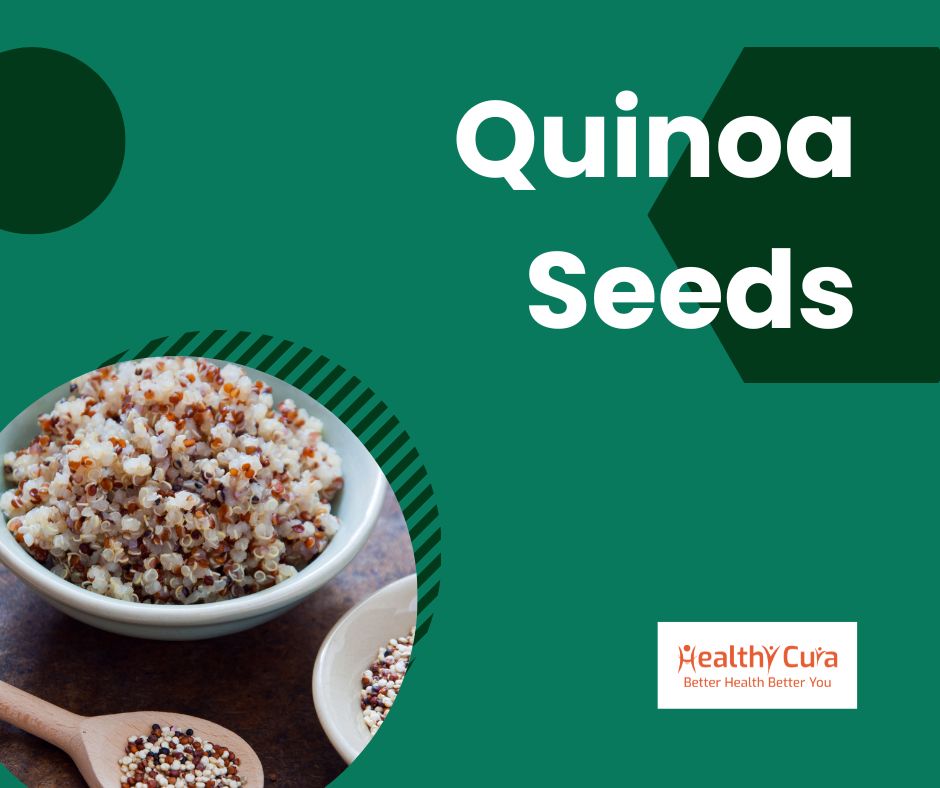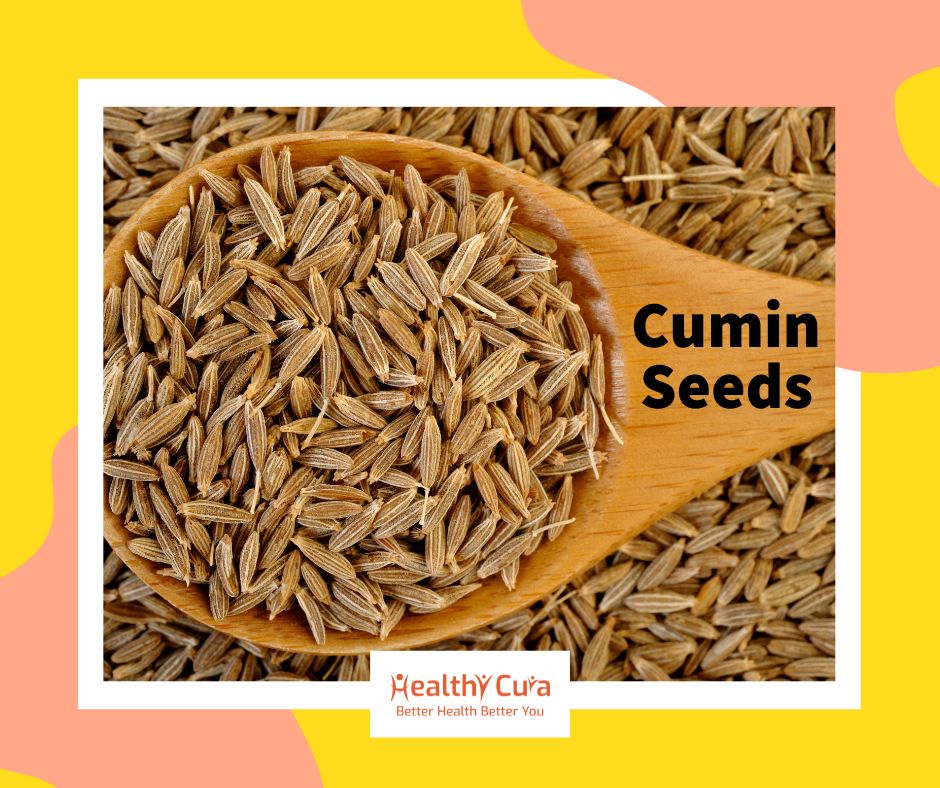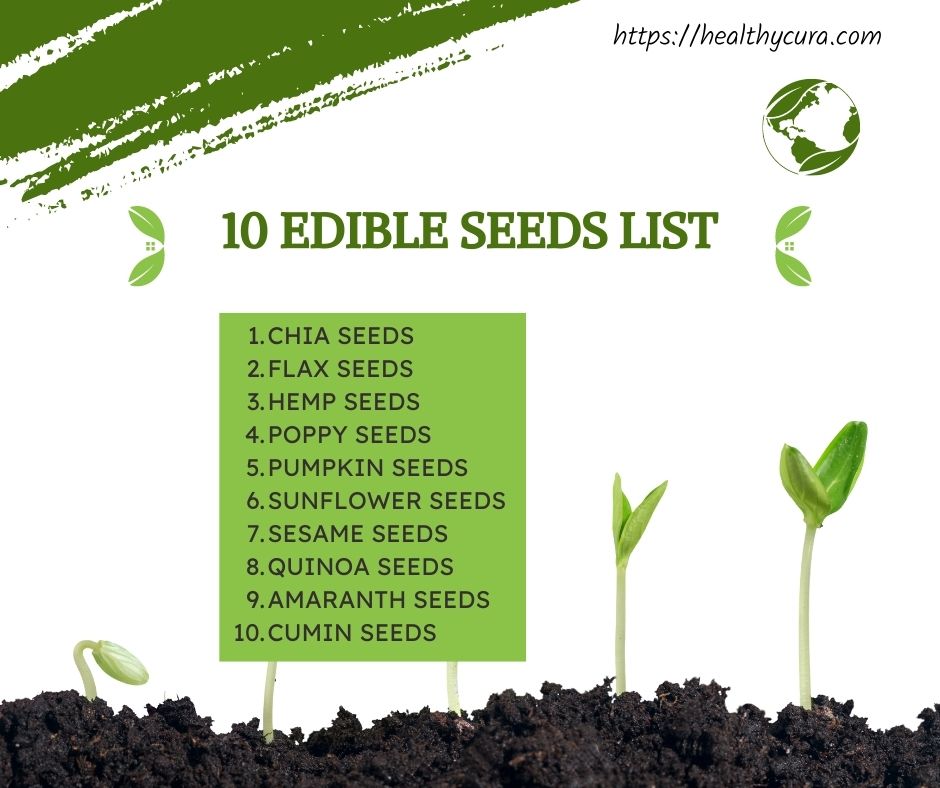Edible Seeds are an often-overlooked food group, but they are very nutritious and versatile.
They can be used in a variety of dishes, from sweet to savory, and they are a good source of protein, fiber, and healthy fats.
Seeds are also a great way to add texture and crunch to your food.
In this blog post, we will explore 10 types of edible seeds that you can add to your diet. From chia seeds to sunflower seeds, there is sure to be a seed on this list that you will love!
10 Edible Seeds List
Here is the list of 10 types of edible seeds you can eat:
- Chia seeds
- Flax seeds
- Hemp seeds
- Poppy seeds
- Pumpkin seeds
- Sunflower seeds
- Sesame seeds
- Quinoa seeds
- Amaranth seeds
- Cumin seeds
Chia Seeds

Chia seeds are a nutritional powerhouse.
They’re an excellent source of omega-3 fatty acids, fiber, and antioxidants.
Just a handful of chia seeds provide a significant amount of these nutrients.
Chia seeds are also high in protein and calcium.
They’re often used as a natural thickener in recipes.
When soaked in water, they form a gel-like substance that can be used in place of eggs or oil in baking recipes.
If you’re looking for a nutritious boost, add chia seeds to your diet. You can sprinkle them on top of cereal or yogurt, add them to smoothies, or use them in baking recipes.
Chia seeds have a high fibre content.
One ounce (28 grams) of chia seeds contains 11 grams of fiber, which is more than one-third of the recommended daily intake for adults (25 grams).
Chia seeds are also a good source of protein, with 4 grams in one ounce. In addition to being a nutritious food, chia seeds have several other potential health benefits.
Chia Seeds and Weight Loss
Several studies have demonstrated that chia seeds can help with weight loss.
In one study, women who added chia seeds to their diet lost more weight and body fat than those who didn’t.
Another study showed that chia seeds may reduce appetite and promote fullness after meals.
This may be due to the high fiber content of chia seeds, which can make you feel full and help you eat less throughout the day.
Additionally, the protein in chia seeds has been shown to boost metabolism and promote fat loss.
Cholesterol-Lowering Effects
Chia seeds can also help decrease cholesterol levels.
One study showed that taking 25 grams of chia seed per day for 12 weeks lowered LDL (bad) cholesterol by 15% and total cholesterol by 11%.
Another study had similar findings and found that taking 30 grams of chia seed per day for 12 weeks lowered LDL cholesterol by 22%. These effects are likely due to the high fiber content of chia seeds.
Anti-Inflammatory Effects
Chia seeds are a good source of omega-3 fatty acids, which are known for their anti-inflammatory effects.
One study showed that people who took 37 grams of chia seed per day had reduced levels of inflammation biomarkers. This suggests that chia seeds may help reduce inflammation throughout the body.
Blood Sugar Control
Chia seeds have also been proven to help with blood sugar regulation.
One study found that taking 37 grams of chia seed per day reduced blood sugar levels by up to 20% in people with diabetes.
Flax Seeds

Flax seeds contain a lot of fibre and omega-3 fatty acids.
They can be eaten whole, ground into a meal, or sprouted and used in salads.
Whole flax seeds can be difficult to digest, so it’s best to either grind them or soak them in water overnight before eating.
Ground flaxseed meals can be added to smoothies, and baked goods, or used as a substitute for bread crumbs.
Flaxseed oil can be used in salad dressings or drizzled over cooked vegetables.
Sprouted flaxseeds have a milder flavor and are easier to digest than whole seeds. They can add to salads or sandwiches for a crunchy texture.
Hemp seeds

Hemp seeds are a great source of nutrition and can eat raw, ground up, or used to make hemp milk.
They contain all 20 amino acids, including the 9 essential amino acids that our bodies cannot produce.
They are also a good source of omega-3 and omega-6 fatty acids, which are important for maintaining heart health and preventing chronic diseases.
Hemp seeds are a good plant-based protein source for vegans and vegetarians.
Poppy seeds

Poppy seeds come from the opium poppy and have a nutty flavor.
They are often used in baking and can be found in many Asian dishes.
The edible seeds of the poppy plant are known as poppy seeds.
The small black seeds are found in the seed pod of the poppy flower.
Poppy seeds are popular in baking because of their nutty taste.
Poppy seeds can be crushed or utilised whole.
When using whole poppy seeds, they need to soak in water for a few hours before use. This helps to soften the hard outer shell of the seed.
Ground poppy seeds can use without soaking, but they will not provide as much flavor.
Poppy seeds are a rich source of fibre, minerals, and vitamins.
They contain high levels of calcium, iron, magnesium, phosphorus, potassium, and zinc.
Poppy seeds also contain antioxidants and anti-inflammatory properties.
Pumpkin seeds

Pumpkin seeds are an excellent source of nutrition and offer a range of health benefits.
They are a good source of protein, fiber, and healthy fats, as well as vitamins and minerals including iron, magnesium, and zinc.
Pumpkin seeds have been found to promote immunity, decrease inflammation, and improve heart health.
Additionally, they may also help with weight loss and blood sugar control.
Sunflower seeds

The edible seeds of the sunflower plant are known as sunflower seeds.
They are delicious and you can eat them raw, roasted, or mixed into flour.
Sunflower seeds are high in vitamin E, protein, and fibre.
Sunflower seeds are a type of edible seed that comes from the sunflower plant.
The sunflower plant is widely present in North America, and Native Americans have consumed its seeds for generations.
Sunflower seeds are high in protein and fiber, and they contain vitamins and minerals that are essential for human health.
Sunflower seeds can be eaten raw, roasted, or ground into a flour that can be used to make bread, cereals, and other foods.
Sesame seeds

Sesame seeds are a types of edible seeds that comes from the sesame plant.
You may eat the seeds whole or grind them into a powder. They have a nutty taste and are popular in Asian cooking.
Sesame seeds are a good source of nutrition and contain vitamins, minerals, protein, and fiber.
They also contain antioxidants and phytochemicals that may protect against chronic diseases such as cancer and heart disease.
When shopping for sesame seeds, look for them in the bulk section of your grocery store or natural food store. You can also find them online.
Quinoa seeds

Quinoa seeds are a nutritious, gluten-free grain that can cook and eat like other grains.
They are a good source of protein, fiber, and minerals, and can use in place of rice or pasta in many recipes.
Quinoa seeds can be found in most health food stores.
Amaranth seeds

Amaranth seeds are gluten-free and a good source of protein, fiber, minerals, and vitamins.
They can eat cooked or raw, and have a nutty flavor.
Amaranth seeds can be ground into flour and used to make bread, cakes, and pasta.
Cumin seeds

Cumin seeds come from the cumin plant, which is a member of the parsley family.
The seeds use as a spice in many cuisines, including Indian, Middle Eastern, and Mexican.
They have a strong, earthy flavor and can use whole or ground. Cumin seeds can roast to bring out their flavor.
FAQs
Is sunflower seeds bad for the kidneys?
Sunflower seeds above 30g per day with meals can harm the kidneys. Because it absorbs Cadmium from soil which store in its seeds. And this heavy metal can harm and even destroy your kidneys.
Which seed is best for the immune system?
Sunflower seeds contain a lot of vitamin E, which acts as an antioxidant and helps the immune system. According to the National Institutes of Health, one ounce of dry-roasted sunflower seeds contains 49% of your daily vitamin E.
Which seed is good for the skin?
Flax seeds are high in alpha-linolenic acid, an omega-3 fatty acid (ALA). Grinding fresh flaxseeds and adding them to smoothies or salads is an easy way to increase your omega-3 fat intake and maintain healthy skin.
Are seeds good for mental health?
Eating seeds and nuts, which are high in nutrients, can significantly improve your mental health. Pumpkin seeds, which are high in zinc, are an important part of memory-boosting diets. Walnuts are an excellent source of omega-3 fatty acids and other nutrients that promote memory and brain function.
Conclusion
We hope you enjoyed our list of 10 types of edible seeds that you can eat.
As you can see, there are a variety of Seeds out there that are not only edible but also nutritious and delicious.
So next time you’re looking for a healthy snack, be sure to consider one of these options.
